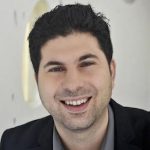Scott Barry Kaufman, professor, researcher, and author of Wired To Create: Unraveling the Mysteries of the Creative Mind, is one of the nation’s leading experts on the science of creativity. On The Psychology Podcast, Scott spoke with journalist and lecturer A.J. Jacobs, a self-proclaimed “human guinea pig” whose extreme lifestyle experiments have been chronicled in his four New York Times bestselling books. The two discussed the gritty details and lessons learned from these experiments, which include reading the entire Encyclopedia Britannica, trying to attain bodily and spiritual perfection, and building a family tree for the entire human race.
Scott: A common theme uniting a lot of things you do is that you treat your life as an experiment. Do you still view that as an ongoing thing?
A.J.: I do. I love that way of living. Trying new things, sometimes succeeding, sometimes failing, and being okay with either one.
Scott: Even before Tim Ferriss, you were the original life-as-an-experiment-er.
A.J.: That’s true. When Tim was writing his first book, The 4-Hour Workweek, I got a call from him. He liked an article I had written in Esquire called “My Outsourced Life,” where I had hired a team of people in Bangalore, India to do everything for me. They answered my phone, answered my email, they argued with my wife for me, they read bedtime stories to my son. It was a fantastic experience. Tim said his book was on a similar topic, and he [wanted] to reprint my article in it. And I said, “Well, he seems like a nice young man. He’s going to sell like, 14 copies. I’m not going to charge him to reprint my article.” Cut to a year later, and he calls me and says, “By the way, my book is number one on Amazon.”
Scott: Let’s do a tour through the books of A.J. Jacobs. Your first one is when I first encountered you.
A.J.: Yes, that was The Know-It-All, and it was about how I decided to read the Encyclopedia Britannica from A to Z, and try to learn everything in the world. That’s what I did. And I forgot 99 percent of it.
Scott: It’s actually all there, encoded in some neuron somewhere. It comes out in your dreams.
A.J.: Good to know. I do remember in my conscious memory things like opossums have 13 nipples.
You know what actually did stick from that experience? Reading all of human history, I realized that the good old days were not good. The good old days were terrible. Lifespan was short, and [everybody] was disease-ridden, smelly, sexist, homophobic, and racist. It was just horrible. Our nostalgia for that time is totally misplaced. It’s life-affirming to realize I would not want to go back to the 1800’s and get a “smoke enema.”
You know the phrase, “Blow smoke up your butt”? It came from a procedure to cure stomach aches. They would literally blow tobacco smoke up the butt.
Scott: That’s amazing. And horrifying. Did you read all the volumes of the encyclopedia? Did you literally read the whole thing?
A.J.: I did. There was some skimming involved, and I’m not saying every word was processed, but I laid my eyes on every single word.
Trending: Navy SEAL Secrets for High Performance Under Pressure
Scott: How did you change from that experience?
A.J.: I became much more grateful for what I have. Seeing the horrors of human history, we’ve got it pretty good, and we tend to forget that. During the year, I got a little carried away because I was ingesting so much knowledge, my wife started to penalize me one dollar for every irrelevant fact that I inserted in conversation. She’d say, “Oh, I have a headache” and I’d say, “Did you know the Bayer aspirin company invented heroin in 1898?” And she would say, “All right, that’s a dollar.”
“I asked what he thought of my project of trying to get smarter by reading the encyclopedia. And he wrote back that it was one of the stupidest ideas he had ever heard.”
Scott: You emailed my advisor, Robert Sternberg, [about the idea].
A.J.: Yes, he’s the expert on intelligence. So I asked what he thought of my project of trying to get smarter by reading the encyclopedia. And he wrote back that it was one of the stupidest ideas he had ever heard. That made my day.
I actually agree that it’s not the best way to become intelligent. There are different types of intelligence. The IQ is way overrated.
Scott: [So] why did you do that book?
A.J.: There was a bit of an Oedipal component. My father started to read the encyclopedia when I was a kid, but he didn’t quite finish. He made it up to the letter B, around Bolivia. So I thought, why not try and finish what he began, remove that black mark from our family history?
And part of it was to try to figure out, what does it mean to be smart? What is the difference between knowledge and wisdom?
Scott: After you [attempted] to improve your mind, you then turned to the spirit world. Why did you decide to live a year Biblically?
A.J.: This came about because I grew up with no religion at all. I’m Jewish, but I’m Jewish in the same way the Olive Garden is Italian. No offense to the Olive Garden.
Then I had a kid, and I wanted to know what to teach him about my heritage. Am I missing anything by not having it, or is it all a bunch of hooey? So I thought, why not live like the Bible says, to see what improves my life and what does the opposite.
Scott: Tell me one from each category.
A.J.: Well what I did is I followed every rule. I followed the Ten Commandments, [for example,] but the Bible [also] says you cannot shave the corners of your beard. I didn’t know where the corners were, so I just let the whole thing grow… I spent time at airport security.
One thing that did help me is the idea of gratitude, which was in the Bible. As for the not helpful, the Bible says you should be grateful for everything. I took that very literally, [in] every little moment in my life. I’d get in the elevator and I’d be grateful that it didn’t plummet to the basement. But there’s a difference between being neurotic and being grateful.
[So I learned] not to take the Bible completely literally. There are millions of people around the world who take the Bible literally; they say “The Bible says that homosexuality is evil, so therefore it is evil.” And my point was, well yeah, you’re taking parts literally, but what if you took the whole thing literally? The Bible also says that shrimp is an abomination so you can’t eat shrimp. The Bible says you can’t wear clothes with mixed fibers, so get rid of all of your poly-cotton blends. The Bible says stone adulterers, so that’s I what I did. I went out and I stoned an adulterer.
Scott: Did you end up in jail?
A.J.: No, because I used very, very small stones, like pebbles. That was my workaround.
“Eat from the fridge, not from the cabinet. Because the fridge has real food that rots, and anything that rots is good for you.”
Scott: In 2012, you published Drop Dead Healthy: One Man’s Humble Quest for Bodily Perfection. What did you do to your body? What changed?
A.J.: I wanted to revamp every part of my life. It was diet and exercise, of course, but also stress levels and sleep and my sex life and my posture … [even] the way I went to the bathroom changed.
Trending: How to Make Menopause the Best Time of Your Life
Scott: How much have you kept from that?
A.J.: I still love the idea of walking as much as possible, so I write on my treadmill. I’m a treadmill desker. I try to not eat processed foods. One good little rule of thumb is, “Eat from the fridge, not from the cabinet.” Because the fridge has real food that rots, and anything that rots is good for you.
Scott: How much weight did you lose?
A.J.: 25 pounds—nothing crazy.
Scott: How tall are you?
A.J.: I’m about 5’11”.
Scott: You looked skinny even before [the experiment].
A.J.: Well you’re nice to say [that], but no, my wife called me “four months pregnant.” I was skinny-fat, so I looked like a snake that had swallowed a goat.
Scott: So you are keeping some of the healthy habits.
A.J.: Definitely. There are studies about alcohol [saying that] one drink a day is correlated to a longer life. Correlation doesn’t imply causation, but still, I like the correlation. So I have at least one drink a day.
Scott: Let’s move on to What It Feels Like. I always think to myself, “I don’t want to do some of those things, but I would love to know what I’m missing out on.”
A.J.: It’s very voyeuristic. [The book] ranged [across] the most extreme experiences, good and bad. What it feels like to be in avalanche, to walk on the moon, to be shot…
Scott: Shot in the head, if I remember correctly.
A.J.: Shot in the head, that’s right. It doesn’t feel great, apparently.
One that I loved is what it feels like to be almost 8 feet tall. This basketball player who was 7’9” said that it’s a dirty world up there. When you look at the top of people’s fridges that they never clean, and the ledges over doorways. I just loved that because it’s something you’d never think about, but of course, he’s seeing the world from a totally different point of view, and it’s dirty.
“The farthest cousin you have on Earth by blood is about a 70th cousin. So we share 99.9 percent of our DNA.”
Scott: Let’s talk about your next book. It’s not out yet, correct?
Trending: Microsoft, Google, and Beyond: What Business at the Cutting-Edge of AI Looks Like
A.J.: I am writing it as we speak.
Scott: And it’s about how we’re all related.
A.J.: That’s right. This one started because two years ago, I got an email from this guy that said, “You don’t know me, but I’m your 12th cousin.” Of course I thought the next line was gonna be, “Here’s my bank account in Nigeria, please send $10,000 immediately.”
But he was for real, and he’s part of this group of people who are building a family tree of the entire world. It’s a wild revolution happening, and it’s happening because of DNA testing and the internet, where people are combining their trees [in] a Wikipedia-like version of family trees, where millions are working on it at the same time. I’m on the biggest tree, which is now about 105 million people. I can see how I’m related to almost anyone in the world, like Barack Obama. He is my fifth great aunt’s husband’s brother’s wife’s seventh great nephew.
Scott: Are you serious? You memorized that?
A.J.: Yeah, that’s the one I memorized. I can’t memorize them all.
According to an MIT study, the farthest cousin you have on Earth by blood is about a 70th cousin. So we share 99.9 percent of our DNA, and that’s the big message: we are so remarkably similar that this tribal mentality is kind of crazy. There is no “us” versus “them.” It’s just us, that’s it.
It’s not going to cure all racism and war, but I do think that it might nudge us in the right direction, and I’m not alone in this. One of my real cousins is a behavioral economist and professor named Cass Sunstein. He [observed] this idea of the family bias, where you treat people who you know are family, even if they’re distant relatives, better than you treat a stranger. So the idea would be to hijack this family bias and apply it to everyone in the world.
Scott: What else are you currently working on?
A.J.: My latest piece in Esquire is about how I was in the hospital, and [they gave me] that hospital gown that barely covers your butt, and I found it so dehumanizing. So I said, “Do I have to put this on?” and they’re like, “Well, it’s strongly recommended.” And I said, “Yeah, but legally do I have to put it on?” And they’re like, “Well, no, we can’t make you.” [So] I wore my sweatshirt and my sweatpants and I felt 100 times better. It turns out there’s a movement of doctors who say [we’ve] got to get rid of the hospital gown for most patients.
Scott: Is there a hashtag for that?
A.J.: No, but let’s start one. Ditch the gown.
This conversation has been edited and condensed.





























